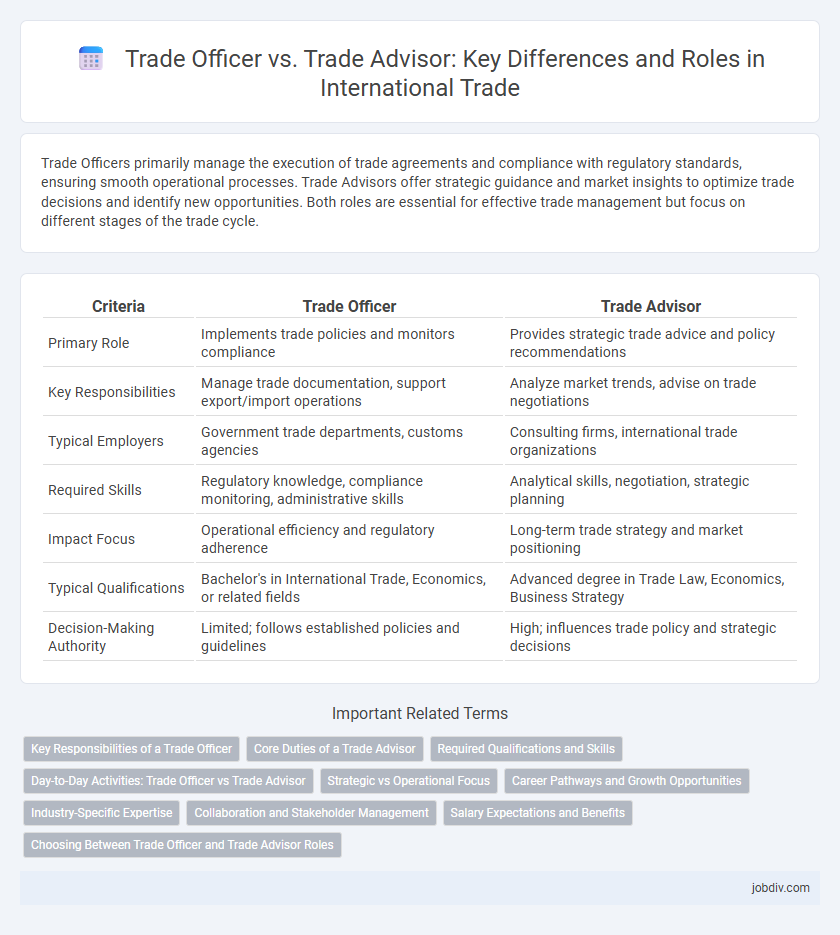Trade Officers primarily manage the execution of trade agreements and compliance with regulatory standards, ensuring smooth operational processes. Trade Advisors offer strategic guidance and market insights to optimize trade decisions and identify new opportunities. Both roles are essential for effective trade management but focus on different stages of the trade cycle.
Table of Comparison
| Criteria | Trade Officer | Trade Advisor |
|---|---|---|
| Primary Role | Implements trade policies and monitors compliance | Provides strategic trade advice and policy recommendations |
| Key Responsibilities | Manage trade documentation, support export/import operations | Analyze market trends, advise on trade negotiations |
| Typical Employers | Government trade departments, customs agencies | Consulting firms, international trade organizations |
| Required Skills | Regulatory knowledge, compliance monitoring, administrative skills | Analytical skills, negotiation, strategic planning |
| Impact Focus | Operational efficiency and regulatory adherence | Long-term trade strategy and market positioning |
| Typical Qualifications | Bachelor's in International Trade, Economics, or related fields | Advanced degree in Trade Law, Economics, Business Strategy |
| Decision-Making Authority | Limited; follows established policies and guidelines | High; influences trade policy and strategic decisions |
Key Responsibilities of a Trade Officer
A Trade Officer is primarily responsible for promoting export and import activities, conducting market research, and facilitating trade agreements to support economic growth. They manage client portfolios, liaise with government agencies, and ensure compliance with international trade regulations. Their role involves strategic planning to identify new market opportunities and advising businesses on trade policies and procedures.
Core Duties of a Trade Advisor
A Trade Advisor primarily provides strategic guidance on international trade regulations, market entry strategies, and risk management to help businesses expand globally. They analyze trade policies, advise on compliance with customs laws, and identify opportunities to enhance export-import performance. Unlike Trade Officers who handle operational trade logistics, Trade Advisors focus on consulting and advisory roles that support informed decision-making and policy development.
Required Qualifications and Skills
Trade Officers typically require a bachelor's degree in international business, economics, or related fields, with strong knowledge of trade regulations and export-import procedures. Trade Advisors often need advanced qualifications such as a master's degree in international trade or business administration, along with expertise in market analysis and risk assessment. Both roles demand excellent communication, negotiation skills, and proficiency in multiple languages to navigate global markets effectively.
Day-to-Day Activities: Trade Officer vs Trade Advisor
Trade Officers manage daily operations such as monitoring export-import regulations, coordinating shipments, and ensuring compliance with trade policies to facilitate smooth international transactions. Trade Advisors focus on providing strategic guidance by analyzing market trends, advising on tariff impacts, and recommending trade optimization strategies to enhance business opportunities. Both roles require strong knowledge of global trade laws, but Trade Officers emphasize operational tasks while Trade Advisors prioritize expert consultation and long-term trade planning.
Strategic vs Operational Focus
Trade Officers primarily concentrate on strategic trade initiatives, developing policies and international partnerships to enhance global market access. Trade Advisors focus on operational execution, providing hands-on guidance and support to businesses navigating trade regulations and compliance. The strategic vision of Trade Officers complements the practical expertise of Trade Advisors, ensuring cohesive trade management.
Career Pathways and Growth Opportunities
Trade Officers typically begin their careers within governmental or international trade organizations, focusing on executing trade policies and facilitating market access, which provides foundational experience in regulatory compliance and international relations. Trade Advisors often have a broader consultative role, offering strategic guidance to businesses seeking market entry or expansion, with career growth linked to developing expertise in economic analysis, negotiation tactics, and cross-border partnership development. Both career paths offer progression into senior roles such as Trade Director or International Business Consultant, where strategic decision-making and leadership skills drive enhanced trade negotiations and economic development initiatives.
Industry-Specific Expertise
Trade Officers typically possess in-depth knowledge of government regulations and international trade policies, enabling them to facilitate compliance and streamline cross-border transactions for specific sectors. Trade Advisors offer specialized industry-specific expertise, providing tailored market insights and strategic advice to businesses aiming to expand or optimize operations within particular markets. Both roles require a strong understanding of trade dynamics, but Trade Advisors tend to deliver more customized guidance based on industry trends, competitive analysis, and sector-specific challenges.
Collaboration and Stakeholder Management
Trade Officers and Trade Advisors collaborate closely to enhance international business opportunities by aligning strategic objectives with market insights. Effective stakeholder management is essential, as Trade Officers engage government bodies and regulatory agencies, while Trade Advisors focus on understanding client needs and industry trends to facilitate informed decision-making. This synergy drives optimized trade policies and tailored advisory services that support sustainable economic growth.
Salary Expectations and Benefits
Trade Officers typically earn between $60,000 and $90,000 annually, with benefits including performance bonuses, health insurance, and pension plans. Trade Advisors often have a higher salary range from $70,000 to $110,000, reflecting their advisory role and expertise, alongside benefits such as professional development allowances and flexible working hours. Both positions may offer international travel opportunities, but Trade Advisors generally receive higher compensation due to their strategic input and client-facing responsibilities.
Choosing Between Trade Officer and Trade Advisor Roles
Choosing between Trade Officer and Trade Advisor roles depends on career goals and expertise in international trade. Trade Officers typically manage trade compliance, regulation enforcement, and facilitate export-import operations, while Trade Advisors provide strategic guidance, market analysis, and policy recommendations to businesses and government entities. Evaluating the preference for operational execution versus advisory and strategic planning assists in making an informed decision.
Trade Officer vs Trade Advisor Infographic

 jobdiv.com
jobdiv.com